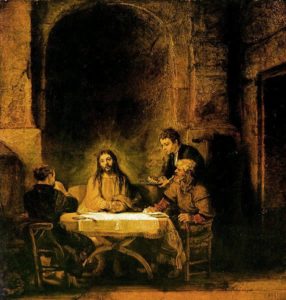Thoughts on Today’s Lessons for April 30, 2017
First Reading: Acts 2:14a,36-41Themes of resurrection continue in our readings for Eastertide. Continuing his first Pentecost sermon, Peter has more harsh words for the Jewish crowd, blaming “the entire house of Israel” for crucifying Jesus, whom God has now made Lord and Messiah. Like the angry references to the Jews in the Passion Gospels, modern Christians should read this only in context. At the time of this writing, there was extreme tension between early Christians and Jews over the status of Jesus as Messiah. We should erase echoes of anti-Judaism and hear in this passage, rather, God’s gracious promise that forgiveness through the gift of the Holy Spirit is available to all.
Our Psalm is heard as a hymn of gratitude for recovery. It vividly describes the anguish of illness and the fear of death. But then through prayer it quickly turns from grief and sorrow to exultation and thanksgiving, reflecting the transforming joy that recovery brings. We can hear an undercurrent of resurrection in escaping the cords of death and the grip of the grave to win the joy of new life.
Second Reading: 1 Peter 1:17-23
This second reading continues with another excerpt from the first letter written in Peter’s name. It gives us some insight into the efforts of the early church to discern the meaning of Jesus’ death and resurrection in our lives, working in these verses on the significance of Jesus’ death as ransom for our sins. This theological quest has continued from the early church through the Middle Ages and even to our times. One point, though, remains clear: Through Christ we trust in God; through Christ we love one another, and through Christ we gain life in the enduring word of God.
Gospel: Luke 24:13-35
Like the apostles fearfully hiding in a locked room who we heard about in John’s Gospel last Sunday, the disciples on the road to Emmaus in Luke’s narrative this week seem uncertain and worried. “We had hoped that he was the one to redeem Israel,” they told the stranger on the road to Emmaus. They don’t seem very convinced by the women’s report from the tomb, either. But then the mysterious traveler reveals himself as Jesus when he breaks the bread, just as Jesus is present when the bread is broken at our Eucharistic table.

